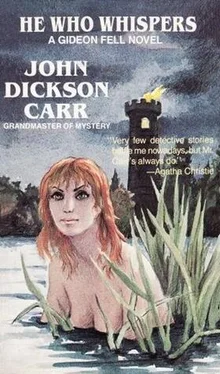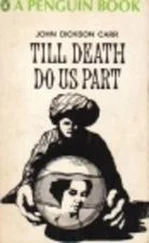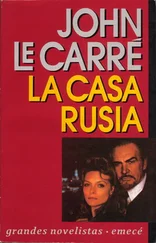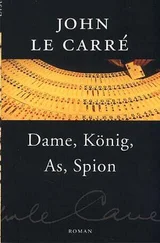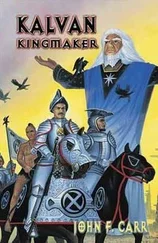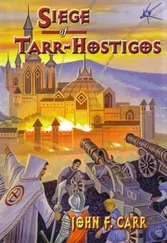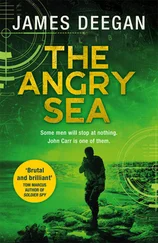Whack!
Dr. Fell brought his hand down sharply on the table. It was only that, the noise of a hand striking wood; and yet all three of his listeners jumped as though they had seen the flash and heard the shot.
Barbara, her face white, got up and backed away from the table. The candle-flames, too, were still shaking and jumping.
“Look here!” said Miles. “Damn it all!”
“I harrumph—beg you pardon,” said Dr. Fell, making guilty gestures and fixing his eyeglasses more firmly on his nose. “It was not really meant to upset anyone. But it was necessary to make you understand the diablerie of the trick.
“On a woman with a weak heart it was not at all problematical; it was certain. Forgive me, my dear Hammond; but you saw what happened in the case of a sound woman like your sister.
“None of us (let us face it) has too-steady nerves nowadays, especially where bumps of bangs are concerned. You said your sister didn't like the blitzes or the V-weapons. That was the only sort of thing that might have frightened her, as it did.
“And, by thunder, sir!--if you are worrying about you sister, if you are feeling sorry for things, if you are wondering how she will take it when she hears of all this, just ask yourself what she would have been let in for if she had married 'Stephen Curtis'.”
“Yes,” sad Miles. He put his elbows on the table and his temples in his hands. “Yes. I see. Go on.”
“Harrumph, ha!” said Dr. Fell.
“Once having tumbled to the trick early this afternoon,” he continued, “the whole design unrolled itself at once. Why should anyone have attacked Marion Hammond like that?
“I remembered the interesting reaction of 'Mr. Curtis' to the announcement that it was Marion who had been frightened. I remembered your own remarks about bedrooms. I remembered a woman's figure in a nightgown and wrap, walking back and forth in front of the uncurtained windows. I remembered a perfume-bottle. And the answer was that nobody had tried to frighten Marion Hammond. The intended victim was Fay Seton.
“But in that case . . .
“First of all, you may remember, I went up to your sister's bedroom. I wanted to see if the assailant might have left any traces.
“There would have been no violence, of course. The murderer wouldn't even have needed to tie his victim. After the first few minutes he wouldn't have needed to hold her at all; he could use his two hands for his revolvers—one empty, one loaded—because the pistol-muzzle at the temple would have been enough.
“But is was just possible that the gag (which he had to have) might have left some traces on her teeth or on her neck. There were none, nor were there traces of anything left on the floor round the bed.
“In the bedroom, a study in frightened woe again presented itself in the person of 'Mr. Stephen Curtis.' Why should 'Stephen Curtis' be interested in trying to kill a total stranger like Fay Seton, with a trick taken from the life of Cagliostro?
“Cagliostro suggested Professor Rigaud. Professor Rigaud suggested Harry Brooke, whom he had tutored in matters of . . .
“Oh Lord! Oh Bacchus!
“It wasn't possible 'Stephen Curtis' might be Harry Brooke?
“No, fantastic! Harry Brooke was dead. A truce to this nonsense!
“At the same time, while I vainly looked round the carpet for traces left by the murderer, some whisk of scatterbrained intelligence kept on working. I suddenly occurred to me that I was overlooking evidence which had been under my nose since last night.
“A shot was fired in here, the would-be murderer using for business gun the .32 Ives-Grant he must have known Marion Hammond kept in the bedside table ('Curtis' again), and for empty gun any old weapon he brought along. Very well!
“At some time following the shot, Miss Fay Seton slipped up to this bedroom and peeped in. She saw something which upset her badly. She wasn't frightened, mind you. No! It was caused by . . .”
Miles Hammond intervened.
“Shall I tell you, Dr. Fell?” he suggested, “I talked to Fay in the kitchen, where I was boiling water. She'd just come from the bedroom. Her expression was hatred: hatred, mixed with a kind of wild anguish. At the end of the conversation she burst out with, 'This can't go on!'”
Dr. Fell nodded.
“And she also told you, as I am now aware,” Dr. Fell inquired, “that she'd just seen something she hadn't noticed before?”
“Yes. That's right.”
“What, then, could she have noticed in Marion Hammond's bedroom? That was what I asked myself in that same bedroom: in the presence of yourself, and Dr. Garvice, and the nurse, and 'Stephen Curtis.'
“After all, Fay Seton had been in that room for quite a long while on Saturday night, talking to Miss Hammond, evidently without seeing anything strange on her first visit to the room.
“Then I remembered that eerie conversation I had with her later the same night—out at the end of the passage, in the moonlight—when her whole attitude burned with a repressed emotion that made her smile, once or twice, like a vampire. I remembered the queer reply she made to one of my questions, when I was asking her about her visit during which she talked to Marion Hammond.
“'Mostly,' said Fay Seton in referring to Marion, 'she did the talking, about her fiance and her brother and her plans for the future.' Then Fay, for no apparent reason, added these inconsequential words: 'The lamp was on the bedside table; did I tell you?”
“Lamp? That reference jarred me at the time. And now . . .
“After Marion Hammond was found ostensibly dead, there were two lamps taken into the room. One was carried by you”--he looked at Professor Rigaud—“ and the other” he looked at Miles—“was carried by you. Think, now, both of you! Where did you set those lamps down?”
“I do not follow this!” cried Rigaud. “My lamp, of course, I placed on the bedside table beside one that is not burning.”
“And you?” demanded Dr. Fell of Miles.
“I'd just been told,” replied Miles, staring at the past, “that Marion was dead. I was holding up the lamp, and my whole arm started to shake so that I couldn't hold it any longer. I went across and put the lamp down—on the chest-of drawers.”
“Ah!” murmured Dr. Fell. “And now tell me, if you please, what was also on that chest-of-drawers?”
“A big leather picture-frame, containing a big photograph of Marion one one side and a big photograph of 'Steve' on the other. I remember he lamp threw a strong light on those pictures, though that side of the room had been darkish before, and— ”
Miles broke off in realization. Dr. Fell nodded.
“A photograph of 'Stephen Curtis,' brilliantly lighted,” sad Dr. Fell. “That was what Fay Seton saw, staring at her from the room as she peeped in at the doorway after the shot. It explained her whole attitude.
“She knew. By thunder, she knew!
“Probably she didn't at all guess how the Cagliostro trick had been worked. But she did know the attempt had been made on her and not on Marion Hammond, because she knew who was behind it. Marion Hammond's fiance was Harry Brooke.
“And that finished it. That was the last straw. That really did make her with with hatred and anguish. Once more she had tried to find a new life, new surroundings; she had been decent; she had forgiven Harry Brooke and concealed the evidence against him about his father's murder; and destiny still won't leave off hounding her. Destiny, or some damnable force which has it in for her, has brought Harry Brooke back from nowhere to try to take her life . . .”
Dr. Fell coughed.
“I have bored you with this at some length,” he apologized, “though the process of thinking it took perhaps three seconds while I wool-gathered in that bedroom in the presence of Miles Hammond, and the doctor, and the nurse, and 'Curtis' himself, who was standing by the chest-of-drawers then.
Читать дальше
